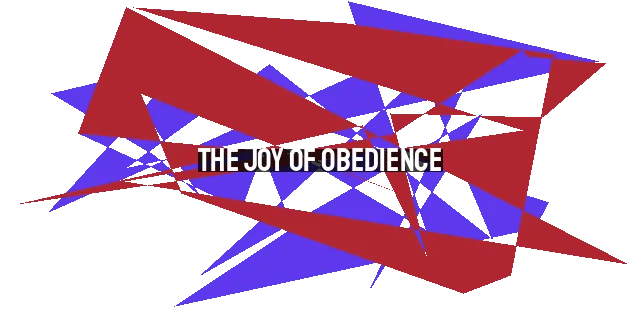The Difference Between Conviction and Condemnation: Finding Freedom in Christ
The Difference Between Conviction and Condemnation
"There is therefore now no condemnation for those who are in Christ Jesus." - Romans 8:1
As Christians, we are called to walk in the light and leave behind the darkness of sin. However, in our journey, we often experience feelings of guilt and shame that can lead us astray. The devil uses these feelings to condemn us and make us feel unworthy of God's love and forgiveness. But it is important to understand the difference between conviction and condemnation.
What is Conviction?
Conviction is a feeling that comes from the Holy Spirit and is meant to lead us towards repentance and growth in our faith. When we sin, the Holy Spirit convicts us of our wrongdoings and points us towards the truth. Conviction is a necessary part of our spiritual journey and helps us become more like Christ.
Conviction is not meant to make us feel ashamed or unworthy. Instead, it is a gentle nudge towards repentance and a reminder of God's grace and forgiveness. When we experience conviction, we should turn to God in prayer and ask for His guidance and strength to overcome our sins.
What is Condemnation?
Condemnation, on the other hand, is a feeling that comes from the devil and is meant to lead us away from God. When we sin, the devil uses our feelings of guilt and shame to condemn us and make us feel unworthy of God's love and forgiveness. Condemnation is a lie that the devil uses to separate us from God.
Condemnation is not meant to lead us towards repentance or growth in our faith. Instead, it is meant to make us feel hopeless and unworthy of God's love. When we experience condemnation, we should turn to God in prayer and ask Him to help us recognize the truth and overcome the lies of the devil.
How to Tell the Difference?
It can be difficult to tell the difference between conviction and condemnation, especially in the early stages. Both can make us feel guilty and ashamed of our sins. However, there are a few key differences that can help us discern between the two.
1. Conviction leads to repentance, while condemnation leads to despair.
Conviction is meant to lead us towards repentance and growth in our faith. When we experience conviction, we should turn to God in prayer and ask for His guidance and strength to overcome our sins. Condemnation, on the other hand, leads to despair and hopelessness. It makes us feel like we are beyond redemption and unworthy of God's love.
2. Conviction points us towards the truth, while condemnation leads us away from it.
Conviction is meant to point us towards the truth of God's Word and His will for our lives. It helps us recognize where we have strayed and how we can return to the path of righteousness. Condemnation, on the other hand, leads us away from the truth. It makes us doubt God's love and forgiveness and can even lead us to believe in lies about ourselves and our worthiness.
3. Conviction is gentle, while condemnation is harsh.
Conviction is a gentle nudge towards repentance and growth in our faith. It is meant to guide us towards the truth in a loving and compassionate way. Condemnation, on the other hand, is harsh and condemning. It makes us feel like we are failures and that there is no hope for us.
What Does the Bible Say About Conviction and Condemnation?
The Bible has many verses that speak to the difference between conviction and condemnation. Here are a few:
1. Romans 8:1-2
"There is therefore now no condemnation for those who are in Christ Jesus. For the law of the Spirit of life has set you free in Christ Jesus from the law of sin and death."
This verse reminds us that there is no condemnation for those who are in Christ Jesus. When we accept Jesus as our Savior, we are set free from the condemnation of sin and death. Instead, we are given new life in Christ and the Holy Spirit to guide us towards righteousness.
2. 1 John 1:9
"If we confess our sins, he is faithful and just to forgive us our sins and to cleanse us from all unrighteousness."
This verse reminds us that when we confess our sins to God, He is faithful and just to forgive us and cleanse us from all unrighteousness. We do not need to wallow in guilt and shame, but instead, we can turn to God in repentance and receive His forgiveness and grace.
3. John 16:8
"And when he comes, he will convict the world concerning sin and righteousness and judgment."
This verse reminds us that the Holy Spirit convicts us of our sin and points us towards righteousness. Conviction is meant to lead us towards repentance and growth in our faith, not condemnation and despair.
4. 2 Corinthians 7:8-10
"For even if I made you grieve with my letter, I do not regret it—though I did regret it, for I see that that letter grieved you, though only for a while. As it is, I rejoice, not because you were grieved, but because you were grieved into repenting. For you felt a godly grief, so that you suffered no loss through us. For godly grief produces a repentance that leads to salvation without regret, whereas worldly grief produces death."
This verse reminds us that there is a difference between godly grief and worldly grief. Godly grief leads to repentance and salvation, while worldly grief leads to death. When we experience conviction, it is important to recognize it as a godly grief that is meant to lead us towards repentance and salvation.
Conclusion
Conviction and condemnation are two very different experiences that we may encounter in our spiritual journey. Conviction is meant to lead us towards repentance and growth in our faith, while condemnation is a lie that the devil uses to separate us from God. It is important to recognize the difference between the two and turn to God in prayer when we experience feelings of guilt and shame. We can trust in God's love and forgiveness and know that there is no condemnation for those who are in Christ Jesus.



POST COMMENT
For post a new comment. You need to login first. Login
COMMENTS(0)
No Comment yet. Be the first :)